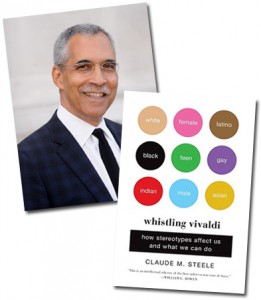Yesterday, two BCD trustees and I attended the Association of Independent Schools in New England (AISNE) annual Governance Conference. Perhaps the best one I have attended in seven years, the conference provided trustees and heads from all over New England the opportunity to attend workshops and presentations from some of the most highly-regarded and internationally-recognized consultants in the field. Each presenter offered comprehensive data and informed expertise based upon their impressive experience working with independent schools around the world.
Dr. Claude Steele presented an inspiring, informative, and thought-provoking keynote talk, “Stereotype Threat: How it affects us and what we can do about it.” Dr. Steele is an internationally renowned social scientist and university executive, and his theory of stereotype threat has been the focus of much of his research and writing throughout his academic career. The theory examines how people from different groups, being threatened by different stereotypes, can have quite different experiences in the same situation. It has also been used to understand group differences in performance ranging from the intellectual to the athletic. Steele’s recent book, “Whistling Vivaldi: And Other Clues to How Stereotypes Affect Us and what we Can Do,” published in 2010, was based on this research and lays out a plan to mitigate the negative effects of “stereotype threat”.
I have the unique opportunity to share Dr. Steele’s talk with you as he essentially presented the same lecture at the Harvard Graduate School of Education the night before the AISNE conference. I invite everyone to watch it and would welcome any chance to speak with you further about it.
After receiving his PhD in 1971, Dr. Steele got his first job as an Assistant Professor of Psychology for two years at the University of Utah in Salt Lake City, Utah, and then moved to the University of Washington in Seattle, Washington for 14 years, receiving tenure in 1985. In 1987, he moved to the University of Michigan in Ann Arbor, Michigan, where he was Professor of Psychology for four years, during the latter two of which he simultaneously held the position of Research Scientist in Univ. of Michigan’s Institute for Social Research. In 1991, he moved to Stanford University in Palo Alto, California, where he was Professor of Psychology for 18 years, receiving the title of Lucie Stern Professor in the Social Sciences in 1997. During his 18 years at Stanford, he also served as Chair of the Department of Psychology for three years (1997–2000), Director of the Center for Comparative Studies in Race and Ethnicity for three years (2002–2005), and Director of the Center for Advanced Study in the Behavioral Sciences for four years (2005–2009), among various other positions (see Teaching and Administrative Appointments, below). In 2009, he left Stanford to become the 21st Provost and Chief Academic Officer at Columbia University in Manhattan, New York for two years, where he was responsible for faculty appointments and tenure recommendations, along with overseeing financial planning and budgeting. In 2011, he left Columbia and returned to Stanford, where he served as the I. James Quillen Dean for the Stanford Graduate School of Education. In March 2014, he became the Executive Vice Chancellor and Provost of the University of California, Berkeley, the nation’s leading public university. (Wikipedia)

